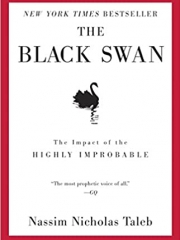The Black Swan by Nassim Nicholas Taleb
Every year, there’s a new black swan event.
1) The Platonic fold is where clean models meet messy reality.
Taleb spends most of the book attacking various ideas, one of which is Platonicity – our tendency to dumb down reality into understandable models and representations. The Platonic fold reminds me of the event horizon.
2) Umberto Eco had a 30,000-book library. Unread books are more important than read books.
Is there a name for the phenomenon where once you learn about something, you see it all the time?
3) The distinction between scalable and non-scalable professions is whether you need to put in more labor and time.
This idea is not revolutionary but perhaps the most practically important. For me, it comes down to whether my output can be put to work when I’m not actually working. I always remind myself whenever I inevitably think about opening a coffee shop.
4) Pyrrhonian skepticism is a school of thought that emphasized achieving happiness by not making judgments.
Taleb talks a decent amount of philosophy. At the risk of completely misunderstanding it, I’d say I’m somewhat of a Pyrrhonian skeptic.
5) Hempel’s raven paradox is … absurd.
a) If something is a swan, then it is white. b) Thus, if something is not white, then it is not a swan. c) This car is not white, and it is not a swan. c) confirms b). Since a) and b) are equivalent, seeing a non-white car has proven that all swans are white. QED.
6) In a good murder mystery, the sum of each character’s probability of being the murderer should be over 100%.
For my next mystery book, I’m going to try harder to guess the culprit. I feel like I’m too afraid to be wrong.
7) Siegfried and Roy ended their show when a tiger attacked Roy in 2003.
The real risk a casino faces is not gambling losses.
8) The Lucas critique is the idea that we can’t measure the impact of an economic forecast because its existence changes the future.
A significant portion of this book is a diatribe against economists. Even though I’m an economics major, I generally agree with Taleb’s points. Economists spend way too much effort trying to explain the past. It’s ultimately a futile effort and a waste of time.
9) The word “serendipity” comes from The Three Princes of Serendip (Sri Lanka).
Etymology is fun. Sri Lanka also gave us Ceylon tea.
10) The fractal, coined by Mandelbrot, preserves its properties across scale.
Taleb added a welcome dimension to his arguments by sprinkling some mathematics on Gaussian vs fractals.
I’d held out on reading this for years. I was hesitant because I didn’t want to read a Malcolm Gladwell-style social science book. This turned out to be anything but. Instead, this book verged on being a full-out rant. Taleb repeatedly praises the select few he admires while ripping apart everyone else. Most of his points are solid. I wholeheartedly agree with the core concept that the world is messy and people mistakenly try to explain away randomness. That said, I have two gripes. 1) He discredits “experts” who selectively cite whatever supports their claims. Yes, this is blatantly true, but isn’t this entire book also guilty? 2) He is against advice and then goes on to give a bunch of his own. To be fair, the advice at the end made the manifesto much more actionable, but it’s difficult to say advice is bad and then write a book. All in all, the takeaway is: when life gives you lemons, make lemonade.
